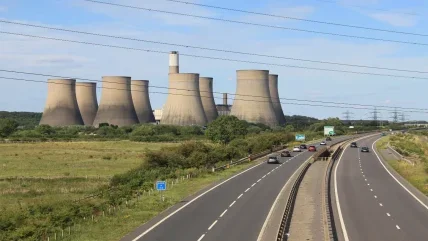
The UK is set to become the first G7 country to completely phase out coal-fired power generation by shutting down its last coal plant, Uniper’s 2GW Ratcliffe-on-Soar facility in England today.
This move marks the end of more than 140 years of coal power in the country.
Located in Nottinghamshire, the Ratcliffe-on-Soar is a hard coal-fired power plant. It was commissioned in 1968 by the Central Electricity Generating Board (CEGB).
The British coal power station features four units, each consisting of a coal-fired boiler made by Babcock & Wilcox, driving a 500MW Parsons generator set.
In 2015, the UK government announced plans to close coal plants within a decade as part of broader measures to meet its climate targets.
At that time, nearly 30% of the country’s electricity was generated from coal, but by last year, this figure had dropped to just over 1%.
The decline in coal power has contributed to reducing the UK’s greenhouse gas emissions, which have more than halved since 1990. The country aims to achieve net zero emissions by 2050, as well as plans to decarbonise its electricity sector by the end of this decade.
This target will require a substantial increase in renewable power sources, including wind and solar.
In 2017, the UK and Canada established the Powering Past Coal Alliance (PPCA) to expedite the global transition away from coal.
The alliance collaborates with its members and partners to deliver best practice and explore international finance to support countries in tackling the challenges of phasing out coal.
PPCA Head of Secretariat Julie Skorupska said: “The UK has proven that it is possible to phase out coal power at unprecedented speed. One third of all countries have committed to do the same when they joined the Powering Past Coal Alliance.
“Others will need to step up their efforts – but they don’t have to do it alone. The PPCA brings together governments, financial institutions and companies to help countries phase out coal and reap the benefits of the clean energy transition.”
According to reports, emissions from energy production account for nearly three-quarters of total greenhouse gas emissions. Scientists have also stressed that reducing the use of fossil fuels is essential to address the targets set under the Paris agreement on climate change.
In April, the G7 group of major industrialised countries agreed to phase out coal power in the first half of the next decade. However, some leeway was provided for economies heavily reliant on coal, a decision that drew criticism from environmental groups.






